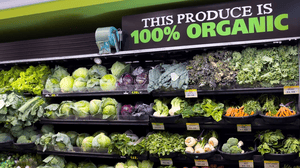Kroger Cuts Carbon Footprint by 2%
CINCINNATI — The Kroger Co. reduced its carbon footprint by approximately 2% in 2011 compared to its 2010 level, generating slightly over 6.4 million metric tons of carbon dioxide-equivalent, according to the retailer’s sixth annual sustainability report released this week.
September 6, 2012
CINCINNATI — The Kroger Co. reduced its carbon footprint by approximately 2% in 2011 compared to its 2010 level, generating slightly over 6.4 million metric tons of carbon dioxide-equivalent, according to the retailer’s sixth annual sustainability report released this week.
“We publicly report our carbon footprint to the Carbon Disclosure Project (CDP),” Kroger said in the report, adding that the organization records “scope 1” carbon measurements (direct carbon generation from refrigerant leaks and use of natural gas, diesel fuel, etc.) and “scope 2” carbon measurements (indirect generation through the use of electricity derived from utilities). “Reducing our carbon footprint remains an important pillar in Kroger’s sustainability agenda.”
Read more: Kroger Boosts Energy Efficiency
In tracking its refrigerant leaks — what it calls “fugitive refrigerants” — Kroger has implemented a new management reporting system. “From this new reporting system, we determined that our fugitive refrigerants increased in 2010 and 2011 from our previously reported numbers,” the report said. “The numbers previously reported were based upon a reporting system that was not as robust as the new one implemented in mid-2010. While we expect fugitive refrigerant figures to generally increase over time as we convert grocery stores from HCFC systems to HFC systems, 2011 fugitive refrigerant fell 3.8% from 2010.”
Kroger added that it has investigated the cost and efficacy of natural refrigerants such as carbon dioxide. “While moving to natural refrigerants is cost prohibitive today, our current prototype uses a distributed refrigerant system, which reduces the refrigerant charge by 45% [compared to] previous systems,” the report said. “We are currently exploring potential HFC-free technologies for supermarket refrigeration in 2015. We will continue to explore and implement, where feasible, alternative designs that continue to lower emissions and reduce our overall refrigerant charge without negatively affecting the economies associated with energy consumption and life-cycle cost.”
About the Author
You May Also Like








